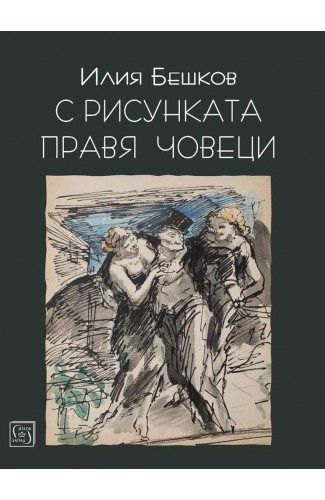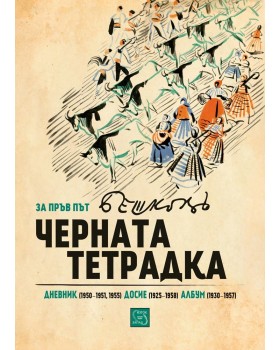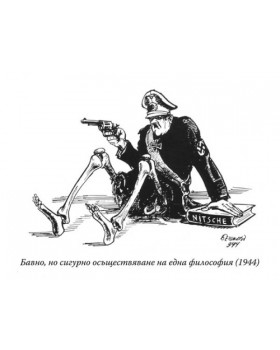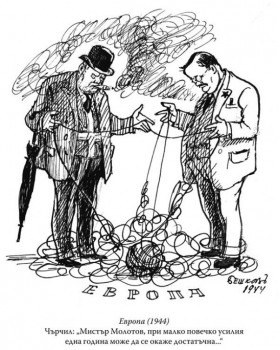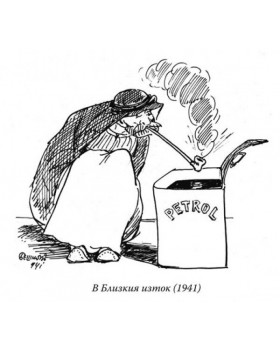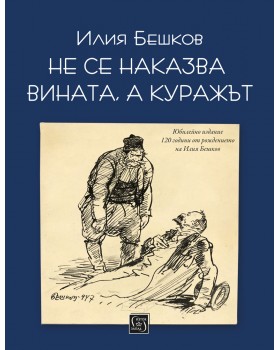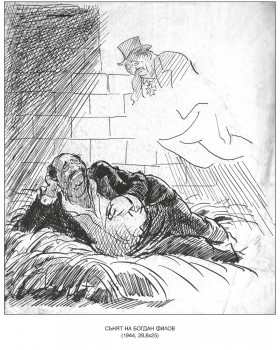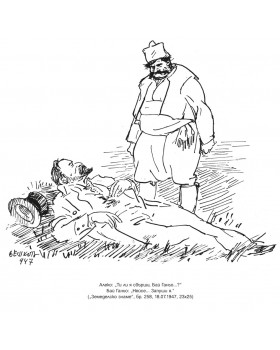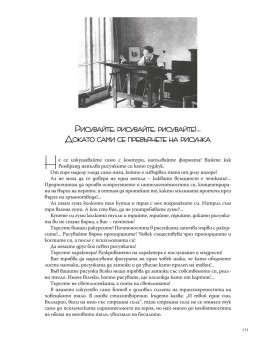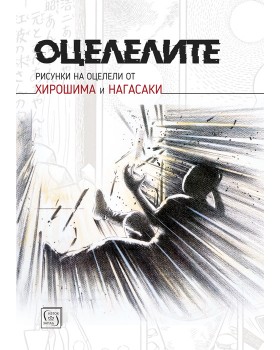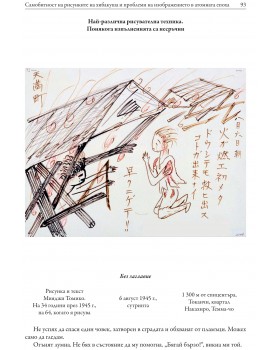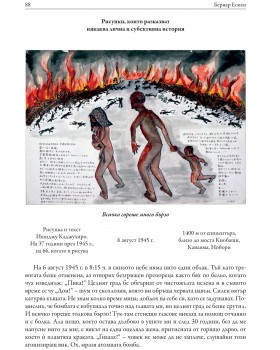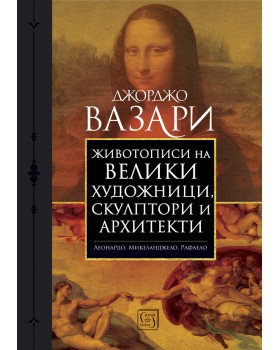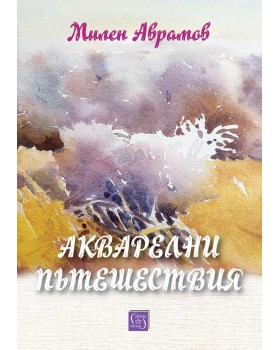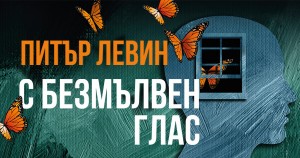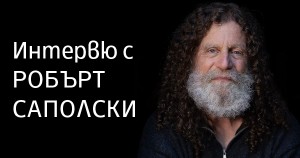Through Cartoons I am Creating Humans
-
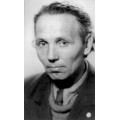
- Author: Iliya Beshkov
- Year: 26-06-2017
- Availability: In Stock
- Product Code: 1945-01
- SKU: 18.0203
- ISBN: 978-619-01-0060-7
 |
Delivery To BOX NOW machine - 1,66 € / 3,24 BGN At an office of Econt - 2,05 € / 4,00 BGN At personal address of Econt - 3,07 € / 6,00 BGN |
 |
Order by phone Call us at 0888 465 635 to order by phone |
HOW DID THIS ALBUM SEE THE LIGHT OF DAY?
The story goes as follows:
During the fifties of the last century the artist Iliya Beshkov was the most favourite professor at the Academy of Art in Sofia. Students of all subjects flocked to listen to him and the halls where he taught were never large enough. Because he was so different from everybody else in his way of speaking and teaching, bands of young people, having forgotten about the lunch in the canteen, always followed him.
The fifties was the time of the Cold War between the East and the West. Sharing one’s thoughts was quite dangerous. Beshkov was watched closely and informed on to the State Security services, as he was in opposition to the government, both during the tsarist and socialist regimes, although those in power were also courting him. None the less both systems of government diligently compiled his dossier, which numbered 200 pages for the period from 1925 to 1958. Because, as he used to say, “I’ve always been in opposition.”
During the Cold War the great erudite and writer Bogomil Rainov, who was a cultural attaché at our embassy in Paris, made desperate efforts to popularize Bulgarian culture, introducing folk singers and folk dance ensembles, artists, writers, opera singers, and musicians. It was he who succeeded in getting the first lucky break of Bulgarian performers and artists beyond the Iron Curtain, with concerts of the Philip Kutev National Ensemble for Folk Songs and Dances and also with the publication of an album of drawings by Iliya Beshkov in Paris.
It was at an auction where Bogomil Rainov made his acquaintance of prof. Manuel Bruker, while both of them were bidding for the etching of Cindarella by Jules Pascin. “We first met by chance in the bidding. Bruker offered such a high bid that I had no choice but to withdraw and gratify myself by a lithograph by Steinlen. While collecting our finds, the Frenchman muttered humorously, “I turned out to be a greater admirer of Pascin than you.” “Anyway, you proved to be wealthier”, I retorted. We had a few more words about the auction and exchanged our appointment cards. “Ah, now I understand your interest in Pascin”, said the professor, having found out I am a Bulgarian.”
At their next meeting the Bulgarian discovered that prof. Bruker, who was a medical doctor by profession, was not only a collector of works of art, but also a publisher of superb luxurious albums with original etchings, printed only in 200 copies for subscribers, which are now antique rarity. Bogomil Rainov showed him photos of drawings by Beshkov. “Brukner took a look at them without curiosity at first, even protesting that he published only world–famous authors. Beginning to examine them, however, his apathy evaporated. I heard him muttering to himself, “Look, this is good, this is even better…” until he said out loud, “Exceptional graphic artist!”
Iliya Beshkov didn’t live to see his drawings printed. He died in January 1958. As we later found out from Bogomil Rainov’s correspondence with the Beshkov family, as well as from the book Paris, published after Rainov’s death, yet another Paris publishing house, Cercle D’Art negotiated a contract to publish a big album by Iliya Beshkov. The director of the publishing house himself, Charles Feld, arrived in Sofia to choose the illustrations. He especially liked the series Nude Bodies. Everything was discussed to the last detail and, as Rainov wrote, “…finally all “the details” came to nothing through the fault of our Committee for Cultural Relations Abroad.” The negatives for the second album were developed, specimen copies were printed. The preparation had considerably advanced, while the publishing house proposed that the Bulgarian side give 2000 leva (of that time) for the edition. The clumsy administrative machine added to the political distrust and hostility and wasn’t able to provide this money. In 1960 Bogomil Rainov came back to Bulgaria and the second album didn’t see the light.
Having been a daughter-in-law in the Beshkov family since 1971, I have often heard about this album, talked with my husband about it, and even scrutinized the French samples, printed on luxurious paper. No one knew where the negatives were. Sixty years after Iliya Beshkov’s death, in January this year (2017), I had been looking for hours for some photos from the archives of the family without much success. Again and again, I browsed through letters, papers, documents, page by page, while all of a sudden I came across a thick yellowish envelope. What could it contain?
Inside were the negatives – 60 drawings for the big Beshkov’s album, which had to be printed in Paris. As if a thunderbolt hit me. Because just then I realized the coincidence – these 60 negatives appeared 60 years after his death! (As I mentioned, Iliya Beshkov died in January 1958.) Is there anything in the world that happens by pure chance?
The art critic Krassimir Iliev and I decided to add to the 60 “French” drawings some more. As many as we have been able to find in museums, galleries, and collections, so that we put our effort into revealing one more aspect of the colossal art of the Bulgarian, who is undoubtedly one of the greatest artists in the world.
About the Author
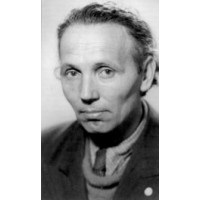
Iliya Beshkov
More by the same author
Related Products
| Specification | |
| Year | 26-06-2017 |
| Pages | 200 |
| Size | Албумно издание, голям формат, 230/300 мм |
| Weight | 0.5 kg |
| Cover Type | Hardcover |
| Genre | Albums, Fine Arts, Artists |

